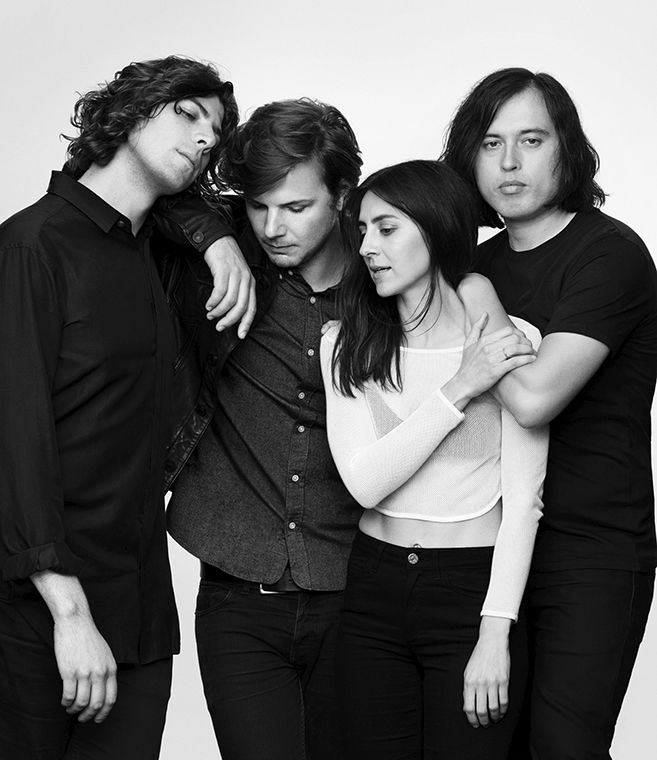HAERTS album finds its ‘Wings’ after years in making
Photo Courtesy of Weston Pagano
The band HAERTS released its debut album Sept. 29, 2014, after working for three years—with and without a producer—to drop the new album.
February 2, 2015
HAERTS formed in the fall of 2010 after childhood friends and long-time musical collaborators Nini Fabi (vocals) and Ben Gebert (keyboard) moved to New York after growing up together in Germany.
The pair met Garrett Lenner, Derek McWilliams and Jonathan Schmidt in New York, and after working for three years to produce their debut album HAERTS, with and without an official producer, the band released the album on Sept. 29, 2014 and went on to tour with the soulful singer Mikky Ekko back in November for a tour that will continue through early 2015
The Chronicle spoke with Fabi and Lenner about how they really met, producing their debut album and what inspires their music.
THE CHRONICLE: There are some rumors about how you all met. What is the truth?
NINI FABI: Unfortunately there is a rumor [that we all met in Iceland] but we’ve never been to Iceland before in our lives. We all met in New York City, and that’s really where our center is. That’s where we all live now.
How do your different backgrounds influence your music?
NF: Our music is 100 percent who we are and it’s about who we are. It’s a reflection of everything that we think about and everything that impacts us. If you think about musical influence and stuff we listen to, we all grew up in different places, but in a way, we also listened to similar things. Whether it’s in the UK, Germany or the U.S., we all had access to the same music.
Your songs “Wings” and “All the Days” were both very popular.
NF: For us, it’s not so much about radio play, it’s more about seeing some kind of reaction from people. It was really worth it for us because when we first started it was really our project because when you’re in the studio for a long time … it becomes a huge part of yourself. You give everything into it and don’t really think about anything else or anyone else. Once you put something out, then there’s a connection with the outside world, and I think if people can relate to something, it’s really a great feeling for us.
Is there a specific message you wanted to convey with this album?
NF: We don’t want any kind of specific message to be conveyed with the album. People should take away what they need or what they want to take away from the album. And it could be different for anyone who listens to it. For us, we don’t want to push any message because the album is about who we are, it’s an album about what was our truth as we wrote [it]. It’s an album that is about love and it’s about people. In a way [it’s about] heartbreak and also the beauty in that, and kind of everything that’s in between. Everyone should just take away what’s important to them, and that’s why we don’t really like explaining it or really pinning it down.
How would you describe the writing and recording processes for your self-titled album?”
GARRETT LENNER: There were three very different phases of making the album. Over the three years that [it] was being produced … we tried to maintain the vision of the album through all of those phases. And in the meantime also being on the road and trying to finish the album when we were performing as a band, too, [it] changed, and it always changes, so there’s not really any set process. It was difficult. Before “Wings” was released, people wanted to hear it live and people had an interest in the band, but we had to take it on the road, but also we didn’t have an album [released yet], so we were doing both [production and touring] at once.
NF: It’s two very different things, recording and performing. Taking the creative process of writing and the creative process of being a performer—it’s two polar opposite things that we do. One is a very intimate thing, something that’s very introverted, and the other one is almost an exhibitionist thing where you kind of show yourself. We want to do both.
GL: Now that the album is out, we can focus on the shows, and that’s a really neat feeling.
How do you want people to feel when they leave your shows?
NF: For us, when we write and make our music, it’s almost like we tap into this thing. You have these things that you’re thinking about and you can channel them into something and that’s the song or that’s the performance. That’s when you can forget everything else. That’s the special part of it and then if we perform it, the music in turn lets [the audience] tap into a place where they can, in a way, ask for something they couldn’t without it. I think that’s what I want them to take away. For some person, a song might make them cry, and for another person, the song might make them laugh.








